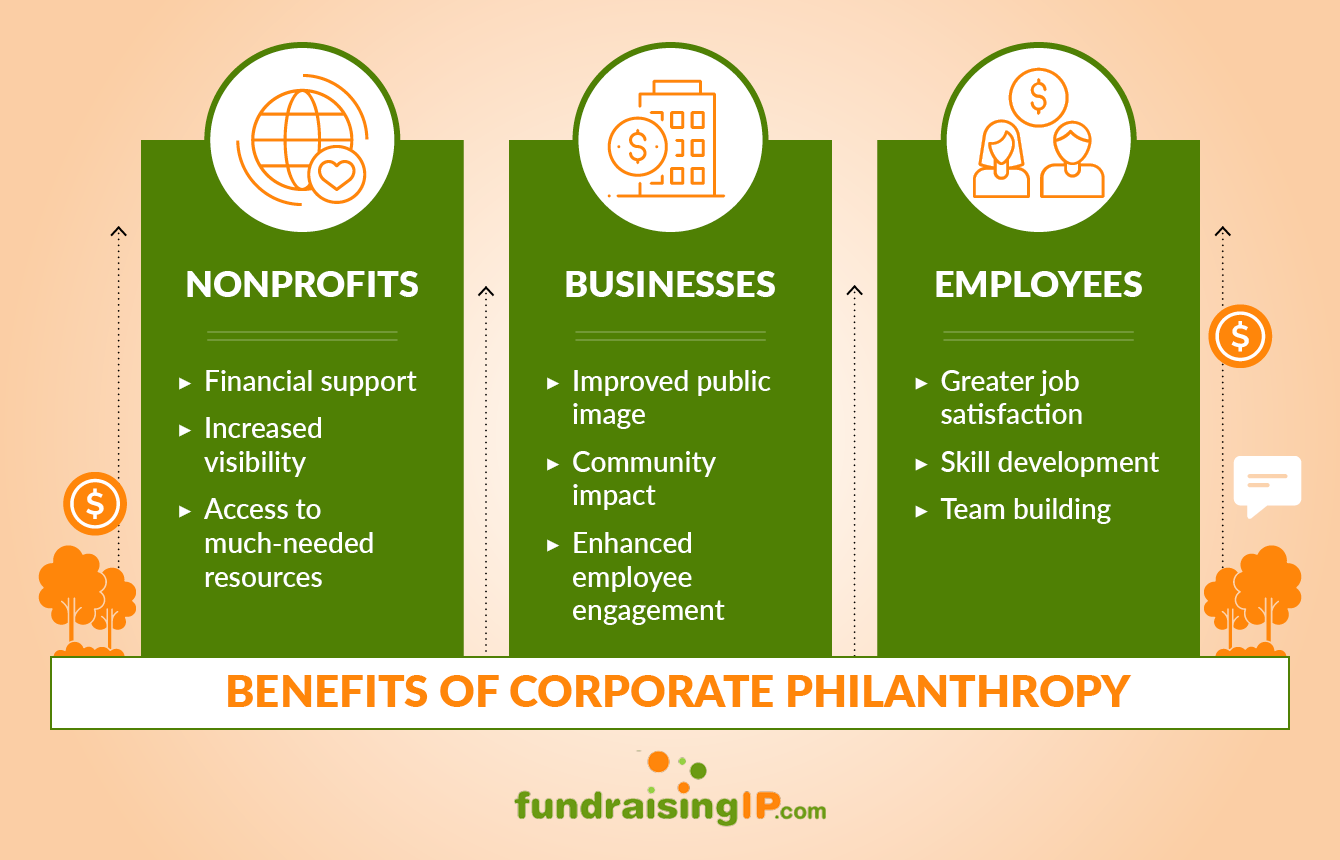The ethical considerations of modern corporate philanthropy
Wiki Article
Why Company Philanthropy Issues: A Guide to Business Social Obligation
Company philanthropy works as a necessary component of corporate social responsibility. It reflects a company's commitment to social concerns and boosts its public image. Organizations engaging in philanthropic efforts typically see enhanced employee morale and more powerful area ties. Nevertheless, the real effect of these efforts can be diverse and intricate. Recognizing the subtleties of business philanthropy can brighten its value in today's service landscape. What are the essential aspects that drive its success?The Interpretation of Company Philanthropy
Business philanthropy describes the charitable payments and initiatives undertaken by organizations to sustain social reasons and neighborhood growth. This idea encompasses a variety of tasks, including economic contributions, worker volunteer programs, and in-kind presents of product and services. Firms engage in philanthropy to address social issues such as education and learning, health treatment, ecological sustainability, and destitution alleviation.Usually, company philanthropy is structured via formal programs or partnerships with nonprofit organizations, permitting services to leverage their resources effectively. These campaigns usually aim to make a positive impact on the area while aligning with the company's worths and goal. Furthermore, business philanthropy mirrors a commitment to business social obligation, showcasing exactly how organizations can contribute to culture beyond profit generation. By taking part in philanthropic efforts, companies can play a considerable role in promoting social change and attending to area needs.
Benefits of Corporate Philanthropy for Businesses
Taking part in business philanthropy offers countless advantages for businesses, improving their track record and cultivating more powerful area ties. Firms that proactively join philanthropic initiatives commonly experience increased employee morale and commitment. When workers perceive their company as socially liable, they are most likely to really feel happy with their workplace, causing greater degrees of work fulfillment and retention.Company philanthropy can produce useful networking possibilities. Collaborating with non-profits and neighborhood companies allows services to get in touch with like-minded individuals and teams, potentially resulting in partnerships that can benefit both celebrations. In addition, businesses participated in philanthropy may discover themselves a lot more enticing to investors and stakeholders who prioritize honest methods.
Inevitably, company philanthropy not just supports societal requirements however likewise provides concrete advantages to services, producing a win-win situation that advertises development and sustainability while adding favorably to the world.
Enhancing Brand Name Commitment With Social Duty
Enhancing brand name commitment via social duty includes structure depend on with customers by lining up business actions with community values (corporate philanthropy). Companies can foster much deeper links with neighborhood interaction initiatives that resonate with their target market. In addition, genuine brand storytelling can further reinforce commitment by showcasing real dedication to social reasonsStructure Count On Through Action
Building trust through activity is an effective method that business can carry out to enhance brand name commitment and foster much deeper links with customers. When businesses proactively engage in company philanthropy, they show a commitment to moral techniques and social duty. This positive technique not only improves their online reputation but likewise reverberates with consumers that focus on values alignment. Openness in philanthropic initiatives is crucial; companies have to successfully communicate their campaigns and the impact they are making. Credibility plays a considerable duty also; customers are more probable to support brand names that genuinely care concerning societal problems instead of those that take part in surface advertising. Inevitably, by prioritizing purposeful actions over simple words, firms can nurture long-lasting trust fund and loyalty amongst their consumer base.Community Involvement Initiatives

Authentic Brand Storytelling
Community engagement efforts commonly work as a structure for authentic brand storytelling, which plays a significant role in growing brand name loyalty. By sharing authentic narratives regarding their social responsibility efforts, business can attach psychologically with customers. These tales highlight the brand name's values, objective, and commitment to societal improvement, fostering count on and relatability. They are extra most likely to establish a deeper affinity and choice for it when customers view a brand as socially liable - corporate philanthropy. Genuine storytelling also encourages openness, inviting consumers to involve with the brand name on a personal degree. Consequently, services not only enhance their credibility but additionally develop long lasting relationships with their target market, eventually leading to raised commitment and advocacy in an open marketThe Function of Employees in Business Philanthropy
Employees play an important her response duty in forming a company's kind efforts through their interaction and participation. Reliable staff member involvement methods can improve volunteerism, bring about purposeful neighborhood impact. As organizations harness the cumulative power and enthusiasm of their labor force, they can promote a society of considering that expands beyond the office.Employee Engagement Strategies
Involvement in corporate philanthropy promotes a sense of objective that prolongs past mere profit-making. Business can boost employee involvement by applying various techniques that urge participation in humanitarian campaigns. One effective method is to develop a coordinating gift program, where the company matches worker contributions to qualified charities, amplifying their effect. In addition, normal interaction about humanitarian initiatives can develop recognition and inspire employees to contribute their time and sources. Giving systems for workers to share their philanthropic passions promotes a feeling of possession and neighborhood. Identifying and rewarding employees for their philanthropic contributions can additionally reinforce a culture of giving, eventually bring about an extra involved labor force lined up description with the business's social obligation goals.Volunteerism and Community Impact
Corporate philanthropy flourishes when individuals actively take part in volunteerism, directly influencing the communities they serve. Staff member participation in volunteer efforts not only enhances company society yet likewise promotes a sense of objective and connection among staff. Via volunteering, employees develop essential skills, such as team effort and management, which can convert into enhanced work efficiency. In addition, when employees join for community creates, they reinforce their bond with the company, improving overall morale and commitment. Organizations that motivate volunteerism often see a positive public picture, as community interaction mirrors their dedication to social obligation. Inevitably, the collective effect of employee volunteer initiatives can change areas, addressing pressing social problems while reinforcing business values and mission.
Gauging the Effect of CSR Initiatives
As companies increasingly buy business social duty (CSR) initiatives, recognizing their effect becomes vital for examining efficiency and guiding future initiatives. Determining the influence of CSR requires a diverse technique, integrating both qualitative and measurable metrics. Key efficiency signs (KPIs) such as neighborhood engagement levels, worker complete satisfaction, and ecological renovations offer useful understandings right into the end results of CSR programs. Surveys and meetings with stakeholders can disclose the social adjustment created by these campaigns, while information evaluation helps track progression against established purposes.Furthermore, aligning CSR objectives with service goals boosts accountability. Organizations can make use of frameworks such as the Worldwide Reporting Initiative or the UN Sustainable Development Goals to systematize their dimension processes. Ultimately, precise assessment of CSR initiatives not only shows a firm's commitment to social obligation yet additionally informs method changes to optimize favorable influence, fostering a culture of sustainability and neighborhood interaction.
Ideal Practices for Applying Effective CSR Techniques
Carrying out efficient CSR approaches calls for a clear understanding of a company's goals and worths, guaranteeing alignment with stakeholder expectations. Successful firms start by performing an extensive evaluation of their social, environmental, and economic effects, enabling them to determine areas for improvement. Stakeholder engagement is important; organizations should actively entail staff members, customers, and area participants in the growth and implementation of CSR efforts.Transparency is another best technique, as it fosters trust and accountability. Firms need to interact their CSR goals and progress honestly, sharing both obstacles and successes. Furthermore, integrating CSR right into the core service technique enhances its influence, making it an essential element of operations instead of an afterthought. Regular analysis and adjustment of CSR efforts, educated by stakeholder comments and changing social requirements, warranty significance and efficacy. By sticking to these methods, companies can produce meaningful and lasting CSR techniques that resonate with their neighborhoods.
Frequently Asked Inquiries
How Can Small Companies Join Corporate Philanthropy?
Small businesses can take part in business philanthropy by donating a percentage of revenues, funding local events, partnering with nonprofits, supplying employee volunteer days, and engaging in social work activities, promoting a favorable influence and enhancing their brand track record.
What Prevail Mistaken Beliefs Concerning Corporate Philanthropy?
Common mistaken best site beliefs concerning company philanthropy include the belief that it's entirely an advertising device, that just huge firms can participate, and that it lacks genuine impact. Numerous undervalue the worth small companies can add via meaningful engagement.How Do Consumers Perceive Companies Participated In Philanthropy?
Customers commonly watch firms taken part in philanthropy favorably, linking such initiatives with company duty, honest habits, and neighborhood support. This understanding can enhance brand commitment, impact investing in choices, and enhance general business credibility in the marketplace.Are There Tax Obligation Advantages for Services Involved in Philanthropy?
Businesses involved in philanthropy typically appreciate numerous tax obligation benefits, such as reductions for charitable contributions. corporate philanthropy. These rewards can improve a business's financial standing while advertising a positive public image via their area interaction effortsCan Corporate Philanthropy Improve Staff Member Retention Fees?
Corporate philanthropy can boost worker retention rates by cultivating a feeling of purpose and belonging among team. Engaged employees, straightened with business worths, are a lot more likely to continue to be dedicated and satisfied within their roles.Business philanthropy serves as a crucial element of corporate social duty. Corporate philanthropy refers to the philanthropic contributions and initiatives taken on by companies to sustain social causes and area advancement. In addition, corporate philanthropy shows a dedication to corporate social duty, showcasing how services can add to society past earnings generation. Engaging in business philanthropy offers many benefits for businesses, improving their reputation and promoting more powerful community ties. Customers often watch companies involved in philanthropy favorably, linking such efforts with company responsibility, ethical behavior, and area support.
Report this wiki page